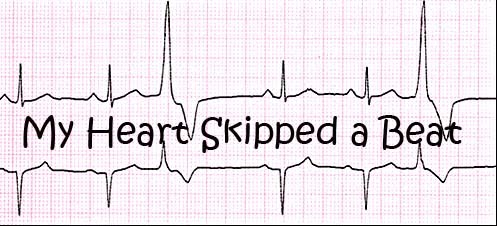3 years ago, at the age of 43, I suddenly started suffering from PVCs. They started one day at work, out of the blue, and haven't stopped since. I'm a woman, and I think what was going on was menopause - early, yes, but that's my lot in life. It's not a lot, but it's my life.
I visited my regular doctor, they did an EKG and found that I was indeed dealing with PVCs. I was sent to a cardiologist and several months of hell had begun. It was found that my aortic valve was bicuspid, this means that it has two "flaps" instead of the customary three, and therefore isn't as efficient as it could be. Not surprisingly, it's leaky. A holter monitor worn for 24 hours also showed that I was dealing with well over 10,000 PVCs a day, and the occasional block lasting longer than comfortable (I used to wake up gasping). The first cardiologist I went to put me on Atenolol, a beta blocker. I shan't bore you with the details, but it was awful. Depression galore. So, we tried another. And another. And another. And I tried cardiologist after cardiologist. Because what some people might not know is, they are devoid of personality. They see people with such serious heart issues that they simply cannot take those of us who "merely" suffer from PVCs seriously. Quite frankly, I was treated with disdain and an arrogance that was out of this world.
After several months, I happened upon an Electrophysiologist (a special cardiologist who deals with the heart's electrical system) and finally, somebody listened. He fitted me with an Event Monitor to be worn for a month, and I was instructed to press a button every time I felt bad, the system would record a minute and a half of the events, and I was to send the information via the phone to him. Well, I think I managed to impress upon this chap, finally, that I was dealing with something horrific. At this point, I was suffering from over 40,000 PVCs a day and it was all I could do to remain standing. I was largely sleeping my life away. He admitted me to hospital and we set out on a trial of a drug called Flecainide. It has been shown to be very effective on PVCs, and let me tell you... it was. But the problem with Flecainide is that for quite a number of people, it has caused worsening arrhythmia, and there have even been deaths. So, the CAREFUL cardiologist prefers to start this drug in a hospital setting where any adverse reactions can be dealt with promptly. I was lucky, however, the drug worked and I had no ill effects.
While I was in the hospital, a cardiac catheterization was done. Why, you ask. Well, I am dealing with something, with these PVCs, that I keep being told can't be happening. They hurt. And quite a bit too, at times. So, they figured I must have blocked arteries (I'm a little bit overweight, so I suppose they could be forgiven for thinking so) and that the pain was down to that. Well.. turns out they were wrong. The arteries in my heart are as clean as could be. However, and thanks to my curiousity, we found that my aorta, where it comes out of the heart, is dilated - probably due to uncontrolled hypertension for some few years, and that had to be dealt with as well. So, I am on a drug for that as well. Woopee. And I go for echos once a year to monitor the dilation and to make sure it's not growing so much that surgery is required. Joy.
Well, the Flecainide worked wonders for me, for almost 2 and a half years, but early this year I started PVCing (yes, I've decided that can be a verb!) again with a vengeance. My body developed a tolerance to the drug, of course. And I can't take a higher dose because my brain protests. So, I'm now trying a new drug, Rhythmol. This drug is used to treat arrhythmias and to maintain a normal heart rate, working on the heart muscle directly. I have only just switched to this drug, and so far I'm still dealing with PVCs so I will let you know as I go along, how it's working.
Finally, if this drug isn't working either, Plan B is to do a cardiac ablation.I'm hoping to avoid this one, it is not without pretty serious risks, after all. Plus... there's only really a 50/50 chance it will work. Time shall tell.
